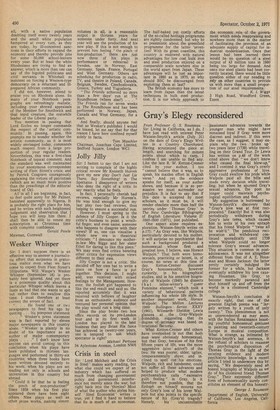Crisis in steel
Sir: ' Lord Melchett and the Crisis in Steel ' makes sorry reading, but what else could we expect of an industry which has suffered so much from changing government policy and government interference not merely since the war, but right back into the 'thirties? Most of what the author who styles himself ' Steel Economist ' writes is true, yet I find it hard to believe that he is much of an economist. The half-baked yet costly efforts of the so-called heritage programme are rightly condemned, but why be so pessimistic about the greenfield programme for the latter 'seventies? With its great coastline, this country is endowed with natural advantages for low cost bulk iron and steel production enjoyed on a comparable scale nowhere else in the world apart from Japan. These advantages will be just as important in 1980 as in 1970, so why should BSC be discouraged from exploiting them at last?
The British economy has more to learn from Japan than the latest techniques in bulk steel production. It is our whole approach to the economic role of the government which needs reappraising and nowhere more than in the matter of facilitating the provision of an adequate supply of capital for industrial modernisation. Once that lesson had been learned there would be no question of a steel output of 43 million tons in 1980 being too large for demand. And rectly located, there would be little once our steel plants had been cor question either of our needing to rely on other countries to provide us with more than a small proportion of our steel requirements. K. I. Wiggs Woodford Green, 3 High Road, Essex
































 Previous page
Previous page